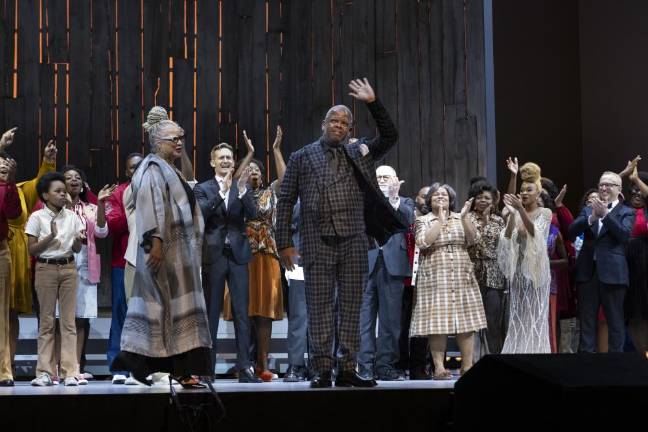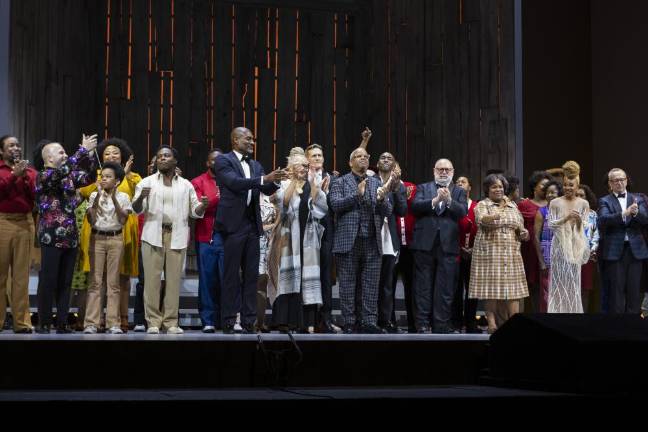At around seven o’clock on a recent chilly Friday night, composer Terence Blanchard, wearing a crimson suit over leather sneakers, walked with his wife into the Metropolitan Opera House, nodded to the usher and went to their seats about twelve rows from the stage.
He may not have intended it, but Blanchard has written perhaps the most modern, fiercest opera the Lincoln Center institution has staged: “Fire Shut Up in My Bones,” a work that both addresses current societal ills and transcends them through the sheer force of its story.
Adapted from journalist Charles M. Blow’s 2014 memoir of the same name, “Fire Shut Up in My Bones” recounts the travails, scars and final victory of its author. Over a majestic libretto by Kasi Lemmons, the fifty-nine-year-old Blanchard infuses Blow’s story with the same drama that he has brought to such Spike Lee films as “25th Hour” and to his own work as a jazz trumpeter.
The New Orleans-born Blanchard began playing trumpet at the age of eight, marveling at the mastery of players like Clifford Brown and Miles Davis, but it was also around this time that he first heard opera. While he admits that music was more his father’s passion, he reflects that the art form significantly influenced him. “I guess it stuck with me inadvertently, hearing those melodies,” he said in a phone interview with the West Side Spirit. “When I became older, I started just listening on my own and was really fascinated by opera from a compositional standpoint.”
Blanchard says that it wasn’t until he received Lemmons’ libretto that he truly sensed the operatic potential of Blow’s story, but he masterfully mines the author’s turmoil through heated arias and booming horns. At the age of seven, Blow was molested by an older cousin. As this scene unfolds on the Met stage, tremulous strings hover above the horror as Char’es-Baby (as he was known, played by Walter Russell III) sits still, dumbstruck at what is going on.
In this episode, as later in the opera when an adult Charles (sung by Will Liverman) endures paddle whacks by his college fraternity brothers, Blanchard issues a fiery sound as the rhythm section drummer Jeff “Tain” Watts pounces on his cymbals and echoes the angst of the protagonist.
“Move Forward”
Notably, as headlines across the country have stated, Blanchard is the first Black composer to have his score performed at the Met. He has repeatedly shared his belief, however, that he is not the first to be qualified for this position and has mentioned William Grant Still and Scott Joplin as two Black composers who lamentably never had such an opportunity. “There were so many people who had the talent,” he says, continuing that they were denied chances due to “the mere color of their skin.”
More pertinent, Blanchard yearns not to be a “token” but a “turnkey” to unlock broader diversity in opera, and he is optimistic about the possibilities. “The only thing we can do is move forward and make sure that we don’t have those types of biases cloud our judgment,” he says. “There are so many different people from different walks of life who have stories to tell that need to be told on the Met stage.”
During the Met’s opening gala for “Fire Shut Up in My Bones,” Blanchard briefly met both an Asian composer and a female composer who have been commissioned to write operas for the Met. He believes these are steps in the right direction to close the cultural separation gap of the 1883-founded institution. “And here’s the thing,” he says. “I even hate mentioning the fact that one was Asian and one was female. They’re composers. That should be the main thing, that they’re composers who are going to have an opportunity to do something on that stage.”
Blanchard is not just a composer but a storyteller and he continually serves Blow’s epic, as when he unleashes fluttering horns to illuminate Blow’s rare moments of joy during his hardscrabble youth in 1970s Louisiana.
The depiction of the latter decades of the twentieth century, especially a 1990s fraternity scene where characters speak in the call-and-response of hip-hop, does indeed comprise possibly the most contemporary, radical opera the Met has ever delivered. The fact that Fire’s harsh realities such as racism persist today only adds to the opera’s relevance.
As Blanchard explains, however, he was “just trying to tell” Blow’s story yet, in doing so, in sprinkling warm keys on scenes such as the author falling in love for the young Greta (sung by Angel Blue), he has written a mythic opera.
Stepping on the Met Opera stage after the curtain, standing amidst a sea of applause, he may even have heralded a whole new era for the art form.
“There are so many different people from different walks of life who have stories to tell that need to be told on the Met stage.” Composer Terence Blanchard

